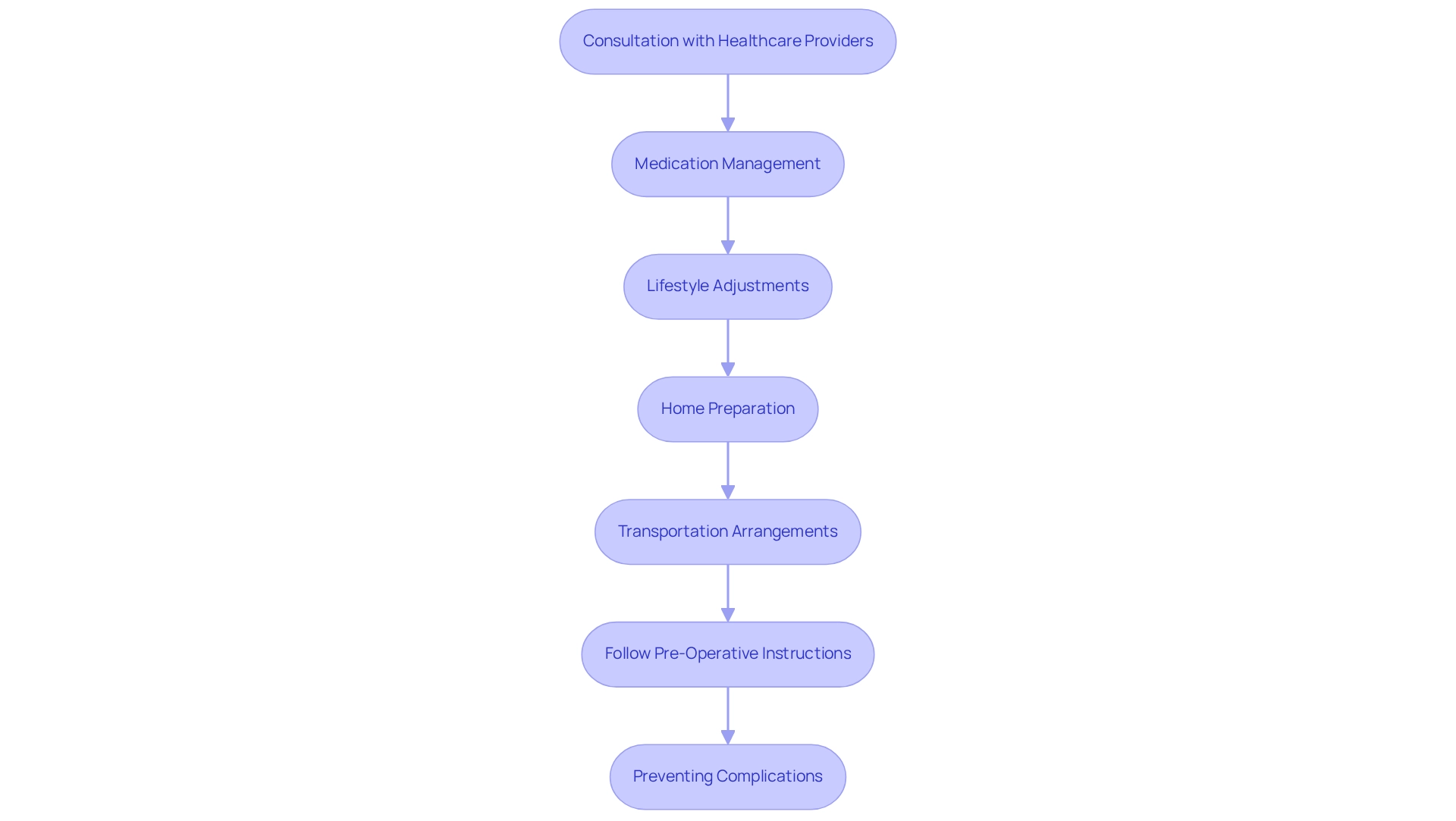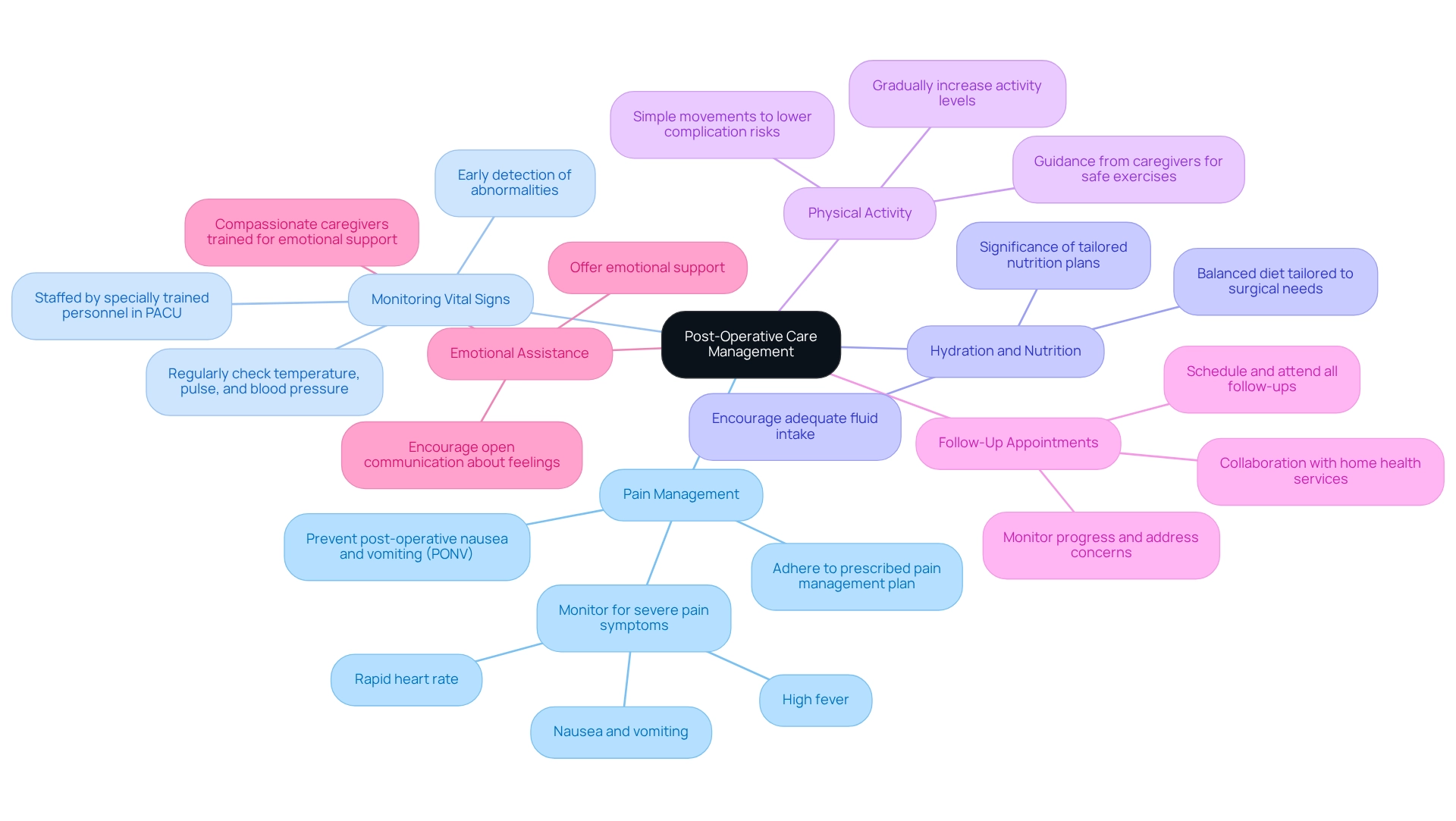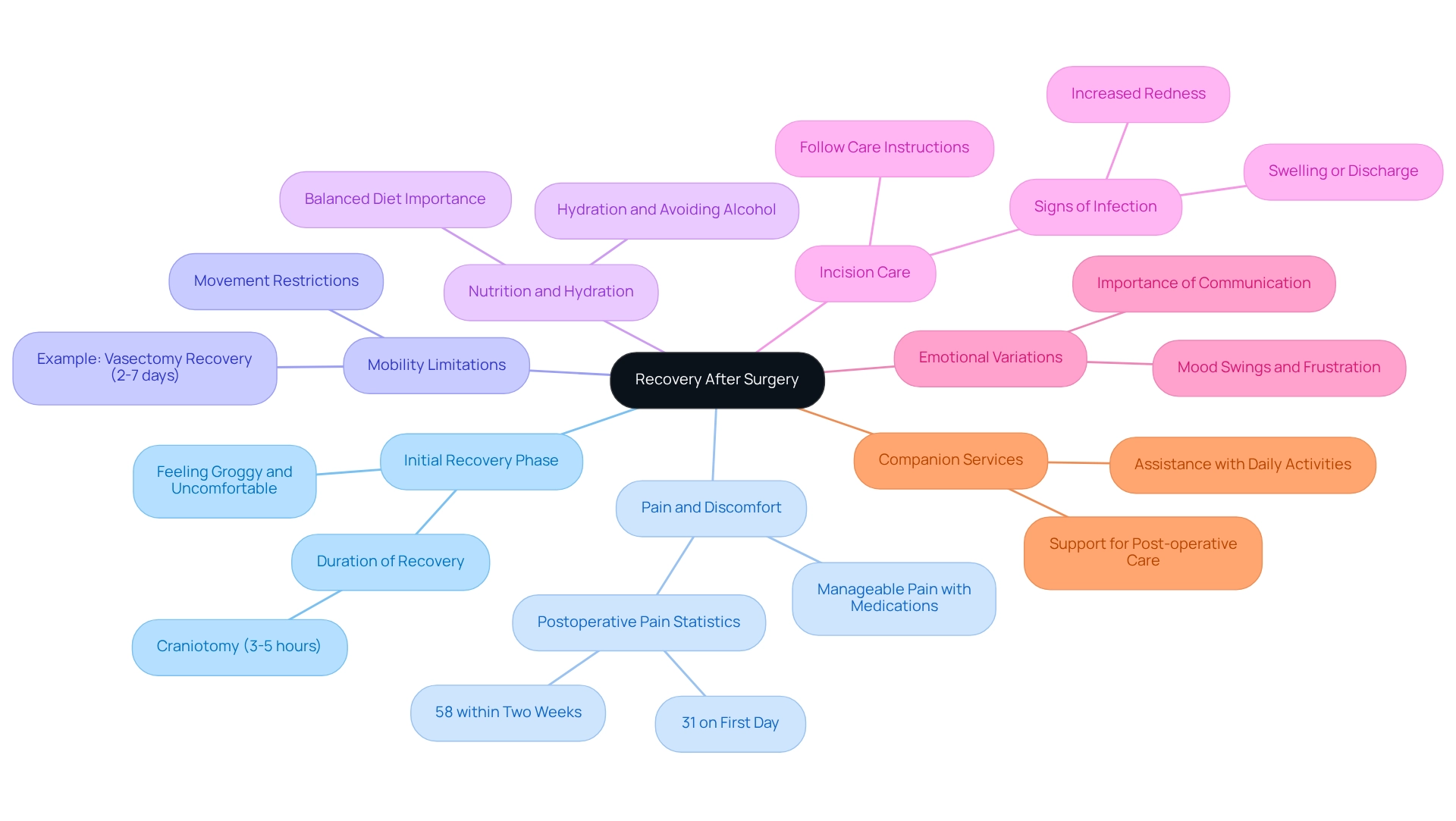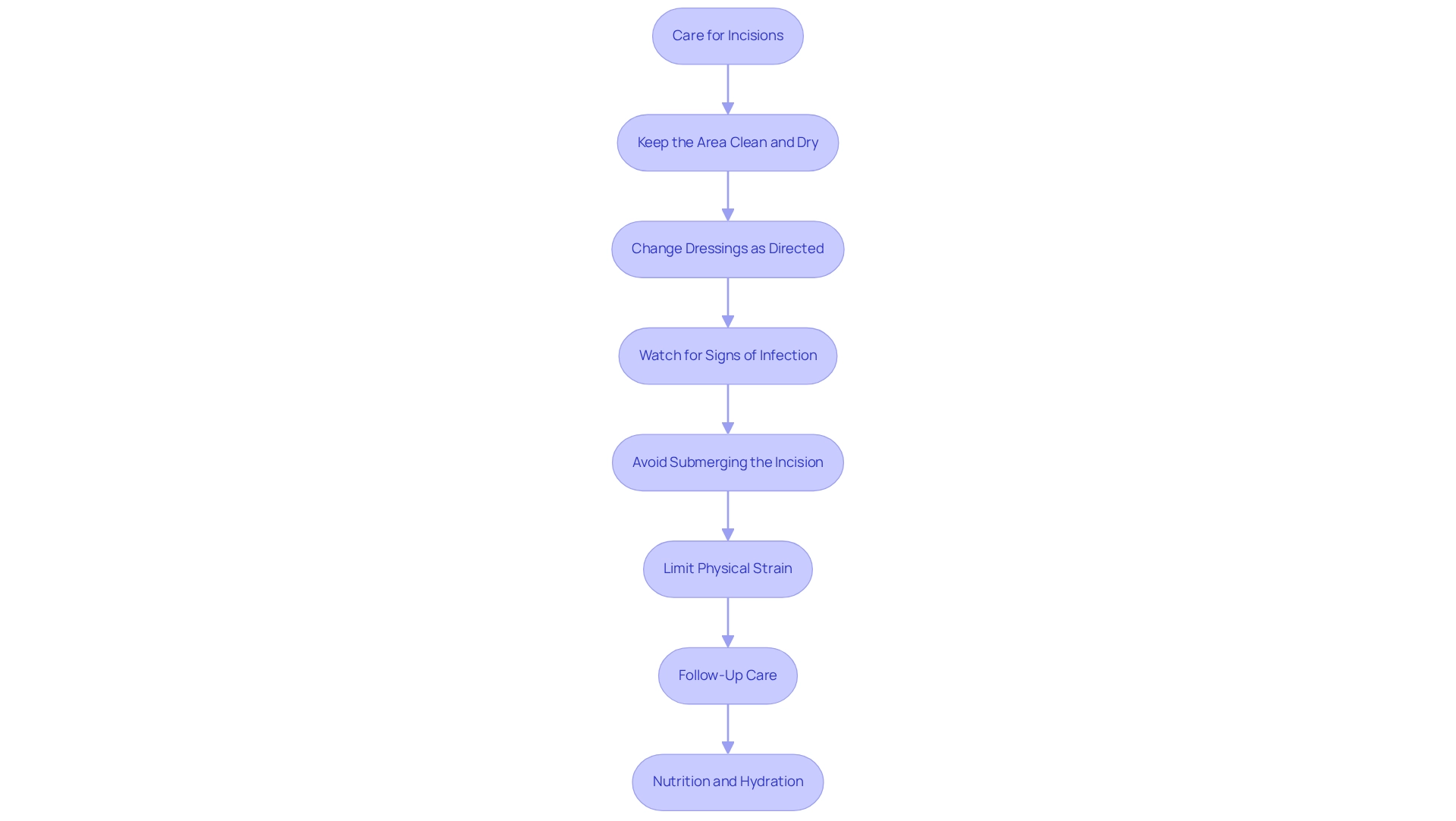Overview
Home care post-surgery is essential for your recovery. It involves important practices such as:
- Pain management
- Monitoring vital signs
- Maintaining hydration and nutrition
- Ensuring follow-up appointments
We understand that this can feel overwhelming, but adhering to these practices—along with emotional support and proper incision care—can significantly enhance your healing outcomes.
Imagine regaining your independence and quality of life. By focusing on these aspects of care, you’re not just healing; you’re taking steps toward a brighter future. In addition, emotional support plays a crucial role in this journey. Remember, you are not alone in this process; we are here for you.
As you navigate your recovery, please prioritize your well-being. Ensuring that you have the right support and care can make all the difference. Your comfort is our priority, and we encourage you to reach out for assistance whenever needed. Together, we can help you regain your strength and confidence.
Introduction
Surgery can feel overwhelming, but understanding the journey from preparation to recovery can truly empower you to take control of your health. By following essential steps before and after your procedure, you can significantly improve your chances of a smooth surgical experience and a swift recovery.
Engaging in thorough consultations with your healthcare providers and managing post-operative care effectively are crucial phases that ensure optimal outcomes. In this article, we will explore vital pre-operative preparations, post-operative practices, and the best ways to care for your surgical incisions, offering you a comprehensive guide as you navigate the complexities of surgery.
Remember, we’re here for you every step of the way.
Prepare for Surgery: Essential Pre-Operative Steps
To ensure a smooth surgical experience and facilitate recovery, it’s essential for patients to follow several important pre-operative steps:
- Consultation with Healthcare Providers: Begin by scheduling a pre-operative appointment to discuss your procedure, potential risks, and recovery expectations. This meeting is crucial for addressing any concerns and ensuring you feel well-informed. Effective preoperative communication has been shown to improve surgical outcomes, underscoring the importance of thorough discussions with your medical team.
- Medication Management: Take the time to review all medications with your healthcare provider. Some medications may need adjustments or temporary pauses to minimize risks during surgery.
- Lifestyle Adjustments: In the weeks leading up to your surgery, focus on maintaining a healthy diet, staying well-hydrated, and avoiding smoking or alcohol. These lifestyle changes can significantly influence your healing results. After surgery, a nutritious diet rich in fruits, vegetables, lean proteins, and whole grains is vital for recovery. Staying hydrated and avoiding alcohol and smoking can further support your healing process.
- Home Preparation: Prepare your home for recovery by decluttering and organizing for assistance. Ensure that necessary supplies, such as medications and comfort items, are readily available to facilitate a smooth transition post-surgery. Identifying the need for companion services can also be beneficial, especially for seniors who may require additional support during their recovery.
- Transportation Arrangements: Organize reliable transport to and from the surgical facility, as you will be unable to drive yourself following the procedure. Having dependable transportation is essential for a stress-free experience.
- Follow Pre-Operative Instructions: Adhere to any specific guidelines provided by your medical team, including fasting protocols or bathing with antiseptic soap before surgery. For instance, the typical fasting duration for young individuals is 12 hours for liquids, highlighting the significance of following these guidelines to reduce complications and enhance healing.
- Preventing Complications: After surgery, it’s vital to take steps to prevent complications such as blood clots. Your doctor may recommend wearing compression stockings, performing leg exercises, or taking anticoagulant medications to reduce the risk. Staying active within the boundaries set by your healthcare provider can also help prevent clots. Avoid prolonged periods of sitting or lying down without movement, and report any symptoms, like swelling, pain, leg redness, or shortness of breath, to your doctor immediately.
By prioritizing these steps, you can significantly enhance your surgical results and overall recovery experience. As MaryAnn B. shared, “I have had surgery and other procedures here before. It is the best facility in the area – staff is professional, courteous, and caring. I wish that other hospitals would follow suit.” This highlights the importance of choosing a compassionate and professional healthcare environment. Continuous improvement in surgical outcomes is driven by technological advancements and enhanced perioperative care, making it essential for you to stay informed about best practices. We’re here for you, and your comfort is our priority.

Manage Post-Operative Care: Key Practices for Recovery
Effective management of home care post surgery is crucial for ensuring a successful healing process. We understand that this time can be challenging, and we are here to support you. Here are some key practices to consider:
-
Pain Management: Adhere to the prescribed pain management plan, which may include medications and non-pharmacological methods such as ice packs or relaxation techniques. Effective pain management is essential. Severe pain should not be accompanied by symptoms like high fever, rapid heart rate, nausea, or vomiting, which warrant immediate medical attention. It is especially crucial to prevent post-operative nausea and vomiting (PONV) after abdominal surgery, as the act of retching and vomiting can stress the abdominal wall and might lead to wound dehiscence (Gan et al.).
-
Monitoring Vital Signs: Regularly monitor vital signs, including temperature, pulse, and blood pressure. Close monitoring is vital for early detection of any abnormalities, particularly in the post-anesthesia care unit (PACU), which is staffed by specially trained personnel equipped to address complications swiftly.
-
Hydration and Nutrition: Encourage adequate fluid intake and a balanced diet tailored to the patient’s specific needs, as nutritional requirements can vary based on the type of surgery. Proper nutrition aids healing and general restoration. Best Care Nurses Registry highlights the significance of tailored nutrition plans to address unique healing needs.
-
Physical Activity: Gradually increase physical activity levels as advised by healthcare providers. Simple movements can greatly lower the risk of complications, such as blood clots, and encourage overall healing. Caregivers from Best Care Nurses Registry can assist in guiding patients through safe exercises to enhance mobility.
-
Follow-Up Appointments: Schedule and attend all follow-up appointments to monitor progress and address any concerns. These appointments are essential for ensuring that the rehabilitation process is on track and for making any necessary adjustments to the care plan. Collaboration with home health services, like those offered by Best Care Nurses Registry, can ensure that individuals receive the necessary home care post surgery, which encourages healing and autonomy.
-
Emotional Assistance: Offer emotional assistance to the individual, acknowledging that healing can be mentally difficult. Encourage open communication about feelings and concerns, as emotional well-being is an integral part of the healing process. Best Care Nurses Registry’s compassionate caregivers are trained to provide not only physical assistance but also emotional support, ensuring a comprehensive approach to healing.
Integrating these best practices into home care post surgery can greatly improve outcomes, allowing individuals to regain their independence and quality of life more efficiently.
Testimonials: “The caregivers from Best Care Nurses Registry were incredibly supportive during my recovery. They not only helped with my physical needs but also provided the emotional support I needed during a challenging time.” – Satisfied Client.
Pet-Friendly Services: At Best Care Nurses Registry, we understand that pets are part of the family. Our caregivers are trained to provide care that accommodates your furry friends, ensuring a comfortable environment for everyone.
For personalized care solutions tailored to your needs, contact Best Care Nurses Registry today at (888) 203-2529.

Anticipate Recovery: What to Expect After Surgery
Recovery after surgery can be a unique journey for everyone, influenced by individual circumstances and the specific procedure performed. It’s natural to have questions and concerns during this time. Here are some common expectations you can anticipate:
Initial Recovery Phase: After surgery, it’s common to feel groggy and uncomfortable, which is a normal part of healing. This phase usually improves within a few days as the anesthesia wears off. For example, a craniotomy, which typically takes about 3-5 hours, may require a longer recovery period due to its complexity.
Pain and Discomfort: While some level of pain is expected post-surgery, it should be manageable with prescribed medications. Did you know that moderate-to-severe postoperative pain affects 31% of individuals on the first day after discharge, increasing to 58% within the first two weeks? It’s crucial to communicate any intense or escalating discomfort to your healthcare provider, ensuring you receive the appropriate care.
Mobility Limitations: Depending on the type of surgery, you may face restrictions on movement, especially if the procedure involved the abdomen or joints. For instance, a vasectomy is known for its relatively short healing period, usually lasting between 2 to 7 days, allowing for a quicker return to your daily activities. Following guidelines for safe movement is essential to prevent complications and support your healing process. Staying active within the limits set by your medical team can also help avoid issues like blood clots, which may require the use of compression stockings or leg exercises.
Nutrition and Hydration: A nutritious diet plays a vital role in your recovery. A balanced diet rich in fruits, vegetables, lean proteins, and whole grains is typically encouraged. Staying hydrated and avoiding alcohol and smoking can significantly aid your healing. If you experience nausea or a loss of appetite, consider smaller, more frequent meals and consult your medical provider for additional guidance.
Incision Care: Taking proper care of your surgical site is crucial. Be vigilant for signs of infection, such as increased redness, swelling, or discharge, and diligently follow the care instructions provided by your healthcare professionals.
Emotional Variations: It’s not uncommon to experience mood swings or feelings of frustration during your recovery. Remember, it’s okay to talk about these feelings. Seeking support and maintaining open communication can greatly benefit your emotional well-being.
Companion Services: Utilizing companion services can provide essential assistance during your recovery, helping with daily activities and ensuring adherence to your post-operative care plan. This support can be invaluable in fostering a safe and effective healing process, and understanding these aspects of home care post surgery can empower you and your family to navigate the postoperative phase with greater confidence and support. As emphasized by an Editorial Board Member at Karger Digital Biomarkers, effective pain management and follow-up care are key components of a successful recovery.

Care for Incisions: Best Practices for Healing
To ensure optimal healing of your surgical incisions, we encourage you to follow these best practices with care and compassion:
-
Keep the Area Clean and Dry: Gently clean the incision site using mild soap and water, steering clear of harsh scrubs. Pat the area dry with a clean towel to prevent any irritation.
-
Change Dressings as Directed: It’s crucial to follow your medical professional’s instructions regarding dressing changes. Always use sterile materials to minimize the risk of infection.
-
Watch for Signs of Infection: Be vigilant for symptoms such as increased redness, swelling, warmth, or discharge. If you notice any of these signs, please reach out to your medical professional promptly, as timely intervention is vital. Remember, risk factors for surgical site infection (SSI) include obesity, diabetes, immunosuppressive therapy, malnutrition, and smoking, making it essential to adhere closely to these practices.
-
Avoid Submerging the Incision: Refrain from soaking the incision in water—such as baths or pools—until you receive clearance from your medical professional. This precaution can significantly reduce the risk of infection. Limit Physical Strain: Avoid activities that may stress the incision site, like heavy lifting or vigorous exercise, until you have approval from your medical professional. Staying mobile within the limits set by your healthcare provider can also help prevent complications like blood clots.
-
Follow-Up Care: Attend all scheduled follow-up appointments to monitor your healing progress and address any concerns regarding the incision. Routine examinations are crucial for avoiding complications and ensuring a seamless healing process. As emphasized in various guidelines, effective follow-up care is essential in lowering infection rates and improving health outcomes.
-
Nutrition and Hydration: A nutritious diet is vital for healing after surgery. A balanced diet rich in fruits, vegetables, lean proteins, and whole grains is typically encouraged. Stay hydrated and avoid alcohol and smoking, as they can impede healing. If you experience nausea or appetite loss, consider eating smaller, more frequent meals and consult your healthcare provider for further guidance on home care post surgery, as implementing these best practices can significantly enhance your recovery experience and reduce the likelihood of complications associated with surgical incisions. Remember, we’re here for you every step of the way.

Conclusion
Understanding the journey from surgery preparation to recovery is pivotal for patients seeking a smooth and effective healing process. By engaging in thorough consultations, managing medications, and preparing the home environment, patients can lay a solid foundation for their surgical experience. These proactive measures not only enhance surgical outcomes but also foster a sense of control over one’s health.
Post-operative care is equally critical. It encompasses pain management, proper nutrition, and emotional support. By following prescribed care plans and attending follow-up appointments, patients can navigate the recovery phase with confidence. Recognizing the importance of monitoring vital signs and engaging in safe physical activity further contributes to a successful recovery.
Lastly, caring for surgical incisions through best practices ensures optimal healing and reduces the risk of complications. Keeping the area clean, changing dressings as directed, and being vigilant for signs of infection are vital components of this process.
In summary, empowering oneself with knowledge and actively participating in both pre-operative and post-operative care can significantly enhance recovery outcomes. By prioritizing these steps, patients not only improve their surgical experience but also pave the way for a healthier future. Remember, we’re here for you every step of the way, and your comfort is our priority.
Frequently Asked Questions
What should I do during the pre-operative consultation?
Schedule a pre-operative appointment to discuss your procedure, potential risks, and recovery expectations. This meeting is important for addressing any concerns and ensuring you feel well-informed.
Why is medication management important before surgery?
Reviewing all medications with your healthcare provider is crucial, as some medications may need adjustments or temporary pauses to minimize risks during surgery.
What lifestyle adjustments should I make before my surgery?
In the weeks leading up to surgery, maintain a healthy diet, stay well-hydrated, and avoid smoking or alcohol. These changes can significantly influence your healing results.
How can I prepare my home for recovery after surgery?
Prepare your home by decluttering and organizing for assistance, ensuring that necessary supplies like medications and comfort items are readily available. Consider identifying the need for companion services, especially for seniors.
What transportation arrangements should I make before surgery?
Organize reliable transport to and from the surgical facility, as you will be unable to drive yourself following the procedure.
Why is it important to follow pre-operative instructions?
Adhering to specific guidelines provided by your medical team, such as fasting protocols or bathing with antiseptic soap, is essential to reduce complications and enhance healing.
What steps can I take to prevent complications after surgery?
After surgery, take steps to prevent complications like blood clots by wearing compression stockings, performing leg exercises, or taking anticoagulant medications as recommended by your doctor. Staying active within the boundaries set by your healthcare provider is also important.
What should I do if I experience symptoms like swelling or pain after surgery?
Report any symptoms such as swelling, pain, leg redness, or shortness of breath to your doctor immediately.











